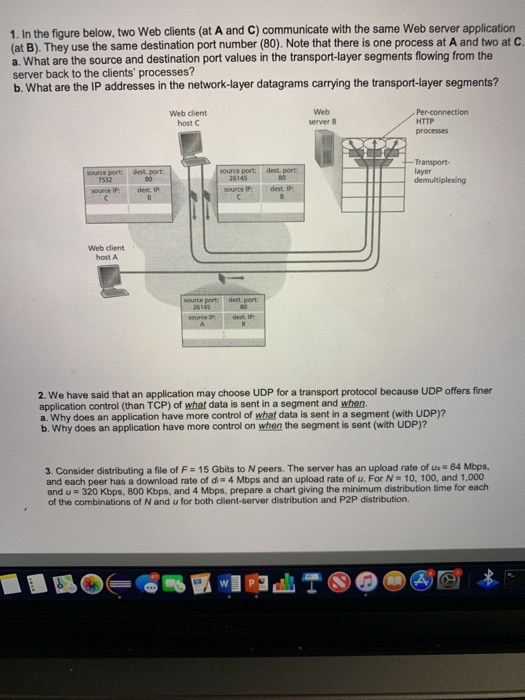Please help!! Thank you!

1. In the figure below, two Web clients (at A and C) communicate with the same Web server application (at B) They use the same destination port number (80). Note that there is one process at A and two at a. What are the source and destination port values in the transport-layer segments flowing from the server back to the clients' processes? b. What are the IP addresses in the network-layer datagrams carrying the transport-layer segments? Web client host C Web server B HTTP processes source port: 26145 dest port B0 Transport- layer source port: dest. port 7532 80 Web client host A source portdest.port 2. We have said that an application may choose UDP for a transport protocol because UDP offers finer application control (than TCP) of what data is sent in a segment and when. a. Why does an application have more control of what data is sent in a segment (with UDP)? b. Why does an application have more control on when the segment is sent (with UDP)? 3. Consider distributing a file of F 15 Gbits to N peers. The server has an upload rate of us 64 Mbps, and each peer has a download rate of d 4 Mbps and an upload rate of u. For N- 10, 100, and 1,000 and u 320 Kbps, 800 Kbps, and 4 Mbps, prepare a chart giving the minimum distribution time for each of the combinations of N and u for both client-server distribution and P2P distribution. 1. In the figure below, two Web clients (at A and C) communicate with the same Web server application (at B) They use the same destination port number (80). Note that there is one process at A and two at a. What are the source and destination port values in the transport-layer segments flowing from the server back to the clients' processes? b. What are the IP addresses in the network-layer datagrams carrying the transport-layer segments? Web client host C Web server B HTTP processes source port: 26145 dest port B0 Transport- layer source port: dest. port 7532 80 Web client host A source portdest.port 2. We have said that an application may choose UDP for a transport protocol because UDP offers finer application control (than TCP) of what data is sent in a segment and when. a. Why does an application have more control of what data is sent in a segment (with UDP)? b. Why does an application have more control on when the segment is sent (with UDP)? 3. Consider distributing a file of F 15 Gbits to N peers. The server has an upload rate of us 64 Mbps, and each peer has a download rate of d 4 Mbps and an upload rate of u. For N- 10, 100, and 1,000 and u 320 Kbps, 800 Kbps, and 4 Mbps, prepare a chart giving the minimum distribution time for each of the combinations of N and u for both client-server distribution and P2P distribution








